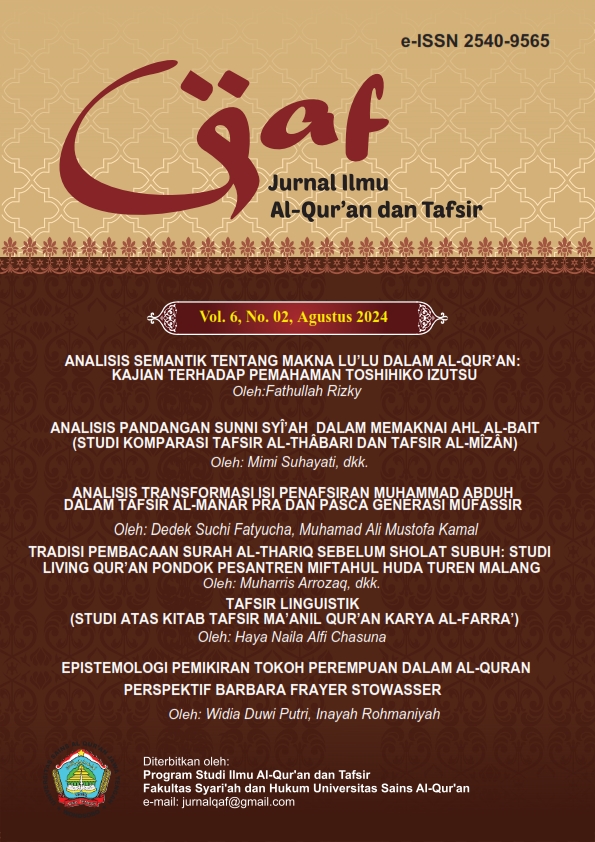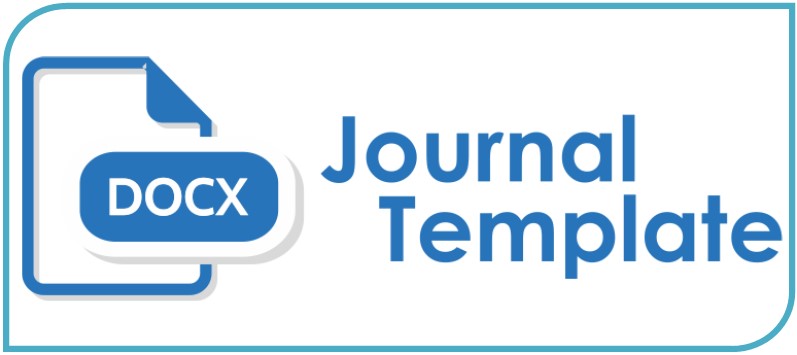THE TRANSFORMATION ANALYSIS OF THE CONTENT OF MUHAMMAD ABDUH'S INTERPRETATION IN THE INTERPRETATION OF AL-MANAR PRE AND POST GENERATIONS OF MUFASSIR
MUHAMMAD ABDUH AND MUHAMMAD RASYID RIDHA
Abstract
This writing was motivated by the emergence of the book Tafsir AlManar in the 20th century, which was a very popular book at that time
both in terms of the popularity of the author's character and in terms of
the quality of the content of the interpretation. Tafsir Al-Manar is
basically the work of three Islamic figures, namely Sayyid Jamaluddin
Afghani, then Sheikh Muhammad Abduh and Sayyid Muhamamd
Rasyid Ridha. Before the author focuses on the formulation of the
problem considering that there are irregularities regarding the
author/originator of this book, whether it is purely the work of
Muhammad Abduh or Muhammad Rasyid Ridha. The author will
briefly touch on several issues related to the interpretation of these two
figures. The focus of this writing is stated in the problem formulation:
1) How was the transformation of the content of interpretation carried
out by Muhammad Abduh before the mufassir generation? 2) What was
the transformation of the content of interpretation carried out by
Muhammad Rasyid Ridha after Muhammad Abduh's interpretation?
These two problems will be focused on according to their respective
principles. This type of research is qualitative in nature, for the time
being it is the object of study so that this article can be formed using
literature study and then analysis is carried out. This research focuses
on literature data sources in the form of documents or written sources.
Meanwhile, the aim of this research is to look at the changes in
interpretation made by the two figures in accordance with the role of
both reason and social conditions used by Muhammad Abduh.
Keywords: Tafsir Al-Manar, Muhammad Abduh, Muhammad
Rasyid Ridha, Transformation
Downloads
References
Abdurrahman, U. (2017). Penafsiran Muhammad ‘Abduh Terhadap Alquran Surat Al-Nisa' Ayat 3 dan 129 Tentang Poligami. Al-’Adalah 14, no. 1: 25.
Asifa, Falasipatul. (2018). Pemikiran Pendidikan Muhammad Abduh Dan Kontribusinya Terhadap Pengembangan Teori Pendidikan Islam. Pendidikan Agama Islam 15, no. 1: 88–98.
Bustamam, Risman, dan Devy Aisyah. (2020). Model Penafsiran Kisah Oleh Muhammad Abduh Dalam Al-Manar: Studi Kisah Adam Pada Surah Al-Baqarah. Mashdar: Jurnal Studi Al-Qur’an Dan Hadis 2, no. 2: 199–218.
Fattah, Mohammad. (2023). Corak Penafsiran Muhammad Abduh Dan Muhammad Rasyid Ridha Dalam Tafsir Al-Manar. Reflektika 18, no. 1: 25–48.
Imam Muhsin. (2015). Perubahan Budaya Dalam Tafsir Al-Qur’an (Telaah Terhadap Penafsiran Muhammad Abduh Dalam Tafsir Al-Manar). Thaqafiyyat 16, no. 2: 121–44.
Junaidi, Mahbub. (2005). Studi Kritis Tafsir Al-Manar Karya Muhammad Abbduh Dan Rasyid Ridha Mahbub. Ii 152.
Madaniy, Malik. Tafsir Al-Manar (Antara Al-Syaikh Muhammad ’Abduh Dan ’Al-Sayyid Muhammad Rasyid Ridha). Journal of Islamic Studies, 1935, 63–81.
Muhibudin. Sejarah Singkat Perkembangan Tafsir Al-Qur’an, n.d., 1–21.
Nofri Andi. (2016) Tafsir Al-ManAr: Magnum Opus Muhammad Abduh. Jurnal Ulunnuha 6, no. Juni 2016: 57–69.
Ridha Muhammad. Interpretation of Al-Manar, 1948.
Ridha, Sayyid Muhammad Rasyid. Tafsir Al-Manar Jilid 12 n.d.
Said, Hasani Ahmad. (2018) Mengenal Tafsir Nusantara: Melacak Mata Rantai Tafsir Dari Indonesia, Malaysia, Thailand, Singapura Hingga Brunei Darussalam. Refleksi 16, no. 2: 205–31.
Sambas, Syukriadi. Pemikiran Dakwah Muhammad Abduh Dalam Tafsir Al-Manar. Disertasi, 2009, 1–271.
Subhan. (2017). Eksistensi Tafsir Al-Manar Sebagai Tafsir Modern 4, no 1: 9–15.




